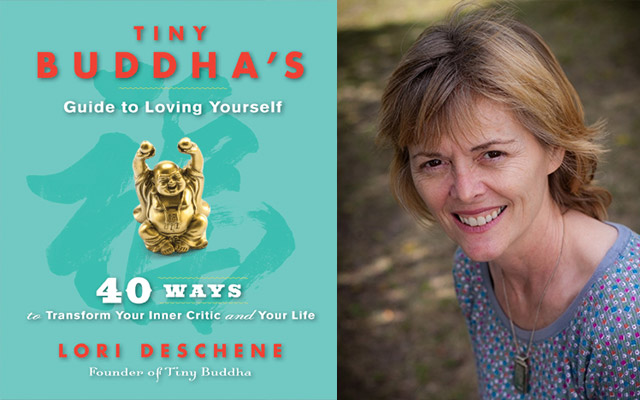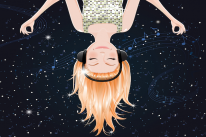
This month we’re celebrating the upcoming launch of Tiny Buddha’s Guide to Loving Yourself, a book about taming your inner critic that features 40 stories from Tiny Buddha contributors.
Throughout September, you’ll have a chance to meet some of them through daily interviews here on the blog.
Today’s featured contributor is Julie Hoyle of True Alignment. Having experienced a profound spiritual awakening, she now teaches others to transform self-limiting beliefs, expand in consciousness, and access their innate gifts, skills, and talents.
Her contribution for the book explores how we can come home to ourselves by embracing our shadow side.
A little more about Julie…
1. Tell us a little about yourself and your self-love journey.
I was born in the UK and have called the Bahamas my home on and off for close to thirty years. In 1989, while living in the capital New Providence, I had a lucid dream.
In the dream, I was tapped on the head by a Yogi in a white loin cloth. Later, I discovered the Yogi was Bhagawan Nityananda, a revered Indian saint who died in the 1960’s.
His touch was radical and life-changing in a way that I could never have anticipated. I was graced with lucid dreams with Saints from diverse paths and traditions who gave teachings and guidance.
In the waking state I was forced to face my inner demons, or what is now commonly referred to as the Shadow. Through this work I began to wake up to the realization that we can only love who we are if we have the courage to accept and transform the darkness within.
2. Have you ever felt there’s “something wrong with you”? If so, why, and what’s helped you change your perception?
I always felt like I never fit in. For example, I could never fathom why most people seemed obsessed with material accumulation and success.
For a while I tried to be the same, but I could not do it. The result was I began to believe there was something fundamental missing in me.
This created pain, discontent, and feelings of isolation. The weight of this pain was so wretched, my spiritual search was focused on finding someone or something that could show me what was missing.
Happily, without consciously realizing it at the time, I began what enlightened masters describe as “the path of return,” the path back to who we are. During the course of this journey, I began to appreciate that “feeling like we don’t fit in” is a blessing. It is typical of people who are mystics.
3. Have you ever thought something was a flaw only to realize that other people actually appreciate that about you? What was the “flaw”?
The flaw was being a natural intuitive. As a child, I would know things about a person without him or her saying anything.
I also had otherworldly experiences and angelic visitations, which I assumed everyone else had too. However, one day I realized that this was not the case. When I was fourteen, I decided it was best to keep quiet about this aspect of my life.
Following a debilitating back problem in my early thirties (prior to Nityananda’s gift of initiation) I became conscious of trying to “stay safe” by closing myself down. From that moment on, I felt compelled to change the dynamic.
Changing the dynamic meant having the courage to share. In the beginning I began writing articles for Mind-Body-Spirit magazines. Then I wrote an E-book about my radical awakening. Later, the work grew to online courses and spiritual counseling.
Looking into the face of my fears has been life-changing. In an organic and beautiful way it has led me to my purpose.
4. What was your biggest mistake (that you’re willing to share), and what helped you forgive yourself?
This is difficult to answer. I really don’t believe in mistakes as such. Everything is a lesson we can learn and grow from. Everything has its own perfection, its own grace.
5. Complete this sentence: When other people don’t like me, I…
…do two things:
- I look inside and reflect on whether I may have said something or acted in a way that may be interpreted as being insensitive or unkind.
- If nothing jumps out in response to #1, I leave it alone. I don’t attempt to change the perception by working to win him or her over.
6. What are some areas in your life where you’ve compared yourself to other people, and what’s helped you let go of these comparisons?
I have never been obsessive about material accumulation. However, when I was in my twenties and early thirties, I would look at what others had and feel less accomplished.
Then I began to realize that appearances are deceptive and that many people live their lives in debt. I did not want that.
I decided my goal would be to keep things simple. Ever since, I have made a determined effort to make sure that if I die tomorrow I will not be leaving anyone in a financial hole.
7. What’s one thing you would tell your younger self about looking to other people to complete you?
The secret to health and wholeness is to value and appreciate yourself; no one else can do that for you. Only you can make you feel whole.
8. Have you ever felt afraid to show people your “real” self? Why—and what’s helped you move beyond that?
For a large part of my life I was tentative and circumspect about revealing my intuitive gifts. I was terrified of being judged or thought of as weird, so I kept things pretty much under wraps.
However, in 2008 my husband and I lost the whole of our life savings when our bank went into liquidation. It was a dramatic wake-up call.
I decided, “To hell with it! If everything is gone I am going to do what I have always wanted to do (which is write, share and counsel), I am going to let things rip and see what happens.” This was the best decision I ever made or I should say, was made for me by dramatic circumstance!
9. What are the top three things you personally need to do to take good of yourself, mentally and emotionally?
- Meditation.
- Exercise, which usually includes swimming, hiking, or cycling.
- Laugh as much as possible and remember not to take myself too seriously
10. What’s something you do regularly that makes you feel proud of the difference you’re making in the world?
Proud is not a word I would use. Being aligned with purpose is integral to wellbeing for me.
Teaching others how to access, listen to, and act on their innate wisdom is incredible. It keeps me in check. It tasks me to be authentic and to reflect integrity.
I love supporting people to wake up. To realize we have the wherewithal to transform challenges and create positive, lasting changes in our lives is a joy. I am honored and grateful to be a part of this alchemical process of self-recognition.
*Note: I edited this post to remove info about the pre-order promotion, which ended on October 8, 2013. You can learn more about Tiny Buddha’s Guide to Loving Yourself here.
About Lori Deschene
Lori Deschene is the founder of Tiny Buddha. She started the site after struggling with depression, bulimia, c-PTSD, and toxic shame so she could recycle her former pain into something useful and inspire others to do the same. You can find her books, including Tiny Buddha’s Gratitude Journal and Tiny Buddha’s Worry Journal, here and learn more about her eCourse, Recreate Your Life Story, if you’re ready to transform your life and become the person you want to be.
- Web |
- More Posts













 Though I run this site, it is not mine. It's ours. It's not about me. It's about us. Your stories and your wisdom are just as meaningful as mine.
Though I run this site, it is not mine. It's ours. It's not about me. It's about us. Your stories and your wisdom are just as meaningful as mine.